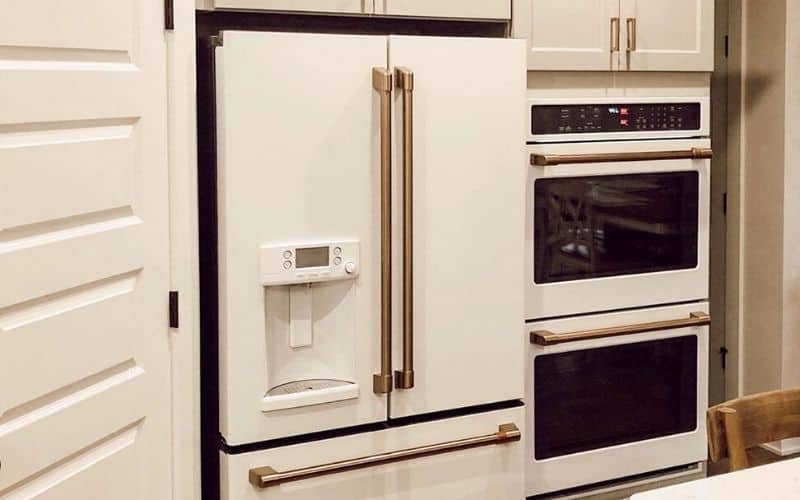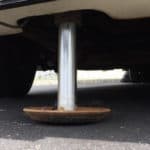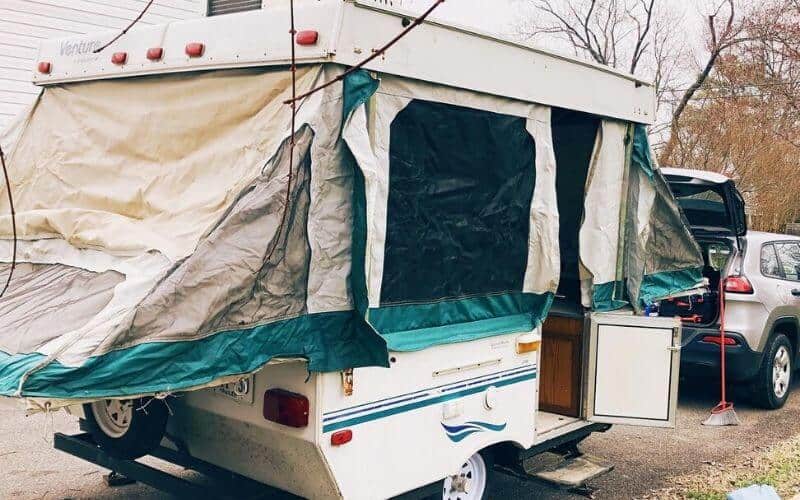It might not look it at first glance, but there are some distinct differences between an RV refrigerator and the residential refrigerator you have in your kitchen.
If your RV’s original fridge has burned out, or you are simply looking to add a refrigerator to your RV, you might be wondering if you can install a residential kitchen refrigerator?
Assuming that the measurements fit, you could technically wedge a residential refrigerator in place and hope for the best. So long as you have somewhat consistent access to 110 Volt electricity, and the fridge is well-insulated, you might be able to get away with it. Yet it isn’t ideal, and if you just hope for the best, you might just find yourself in a tricky situation.
In this article, we’ll take a closer look at the differences between RV refrigerators and residential as well as which one might be right for your situation.
RVRefrigerator Vs Residential Refrigerator
While they do very similar things, RV refrigerators and standard residential refrigerators work very differently.
Understanding a little more about their mechanical processes and their key attributes.
How Does An RV Refrigerator Work?
An RV refrigerator, which is also known as an absorption refrigerator doesn’t use compressed freon like a residential kitchen refrigerator. In fact, it’s doesn’t have any moving parts.
It is specially designed to use heat in concert with a specialmixture of ammonia, hydrogen gas to replicate a cooling evaporation effect.
As the water moves through internal tubes it essentially transfers heat energy to cool the interior of the fridge down.
The heat source that drives this process can be provided by electricity or propane.
This dual-fuel capability means that you can run an RV refrigerator at peak capacity, even if there is no readily available source of electrical current.
You simply switch the refrigerator over to propane and it burns a miniscule amount until you supply it with electricity again.
Most newer RV refrigerators are even built to sense a loss of electricity and will switch themselves over to propane automatically.
Does An RV Refrigerator Have More Or Less Storage?
Your typical RV refrigerator is somewhat smaller than its residential kitchen refrigerator. Most offer around six to eight cubic feet of internal volume.
They also tend to need a little more air space between stored items to maintain the maximum cold.
Some people get around this by placing small battery-powered fans inside the freezer compartment to help keep the air circulating.
How Durable Is An RV Refrigerator?
An RV refrigerator is also made from durable materials and engineered to handle more shaking, bumps and vibration than a somewhat delicate residential refrigerator which is intended to spend its entire life sitting still on the kitchen floor.
In short RV fridges are designed to take the kind of beating that comes with a life lived on America’s bumpy roads.
How Does A Residential Refrigerator Work?
The “Residential” refrigerators that you find in most home kitchens use compression to affect an enclosed volume of freon gas, which draws heat energy out of the refrigerator and freezer space.
They do this using the 110 Volt AC current that runs throughout a home’s electrical system.
Most also include some type of fan or blower mechanism to help circulate the cold air.
With many of these home cooling appliances, the freezer’s fan directs cold air through special venting to share cold air with the refrigerator.
If they are overcrowded the poor air circulation can have a profound impact on cooling performance.
Does A Residential Refrigerator Have More Or Less Storage?
Residential refrigerators are designed to hold the things a family needs throughout the course of a week.
They also have a fair amount of moving parts, blower fans and other things that drive the cooling process.
This means they can accommodate a higher volume than a comparable RV refrigerator. Most of them span from 14 to 18 cubic feet of volume. There are even some large units that boast 20 to 22 cubic feet of internal volume.
Since most provide their own air circulation you can pack them a little more tightly without any adverse impact on their cooling efficiency.
Do Residential Refrigerators Need To Be Kept Level?
With older compression refrigerators you need to keep them level at all times.
Even something as seemingly simple as turning it on its side to move it for a few minutes in the cargo box of a pickup truck can alter the fluid dynamics in the system causing a slew of short and long-term problems.
A minor leveling issue with an older compression refrigerator won’t generally cause a major problem.
Still, if you do have one from say 2005 or so, you want to make every effort to keep it as upright and level as possible.
Fortunately, new compression refrigerators have evolved to be able to handle life on a less than perfect level floor.
This has opened up some new doors for some “Luxury RV” manufacturers.
Can You Use A Regular Compression Refrigerator In An RV?
If you are looking to install a secondhand residential refrigerator in your RV, you might be able to get away with it. The age of the model matters.
You want something that’s from 2006 or newer, to be able to handle the movement and jostling of installation.
If this is just your buddy’s old garage fridge, chances are it’s not going to last as long as you hope it will.
How To Install And Secure A Residential Refrigerator In Your RV
Let’s say you’ve found a newer residential refrigerator or a second hand refrigerator that you want to install in your RV. There are a few things you need to do to install it properly.
Step One: Measure Everything Twice
The doors and entryways in an RV are sometimes narrower than the doors of your home.
Even if you have a spot available inside the RV, the door itself might not be able to accommodate the refrigerator.
When you are taking your measurements, include the space that might be taken up by hand carts and straps.
Step Two: Uninstall Any Existing Refrigerator
If there is an absorption refrigerator currenting in place, you will need to take it out. This requires turning off the propane at the main valve.
Disconnect the line from the back of the refrigerator and install a “Propane Terminator.”
While you are doing this, you should also release the 12-Volt Electrical wires and cap them with wire nuts.
Look for any screws or other fasteners that might be holding it in place and release them. At that point the RV refrigerator should be free to wiggle out and take out the door.
Step Three:Secure The Refrigerator Or Find Help
It can be tempting to try to muscle the refrigerator into the RV yourself. The truth is some residential refrigerators are lighter than they look.
However, they’re very awkward and when one gets away from you, things can get bad in a hurry.
It’s best to get someone else to help you. If you can’t get help, then it’s best to secure the refrigerator to a heavy duty hand cart with ratchet straps.
That way if it does get loose, the hand cart with help stop it before it takes a bad fall.
Step Four: Slide The New Refrigerator Into Place
If you don’t have an exterior access hatch you may need to plug the residential refrigerator into the 120 Volt socket before sliding it into place.
If it feels loose in any way, you might need to secure it with some fasteners.
Two or three well-placed self-tapping sheet metal screws should be enough. You just don’t want the residential refrigerator rocking around when you drive down bumpy roads.
Are There New Residential Refrigerators Designed For RVs?
In recent years compression refrigerator manufacturers and luxury RV manufacturers have started teaming up to offer Motorhomes that come with large residential refrigerators installed.
This allows you to enjoy the large capacity and superior cooling power that you are used to having at home.
What Are The Power Requirements?
Just like your refrigerator at home, an RV compression refrigerator requires a consistent 120 Volt AC source of electricity. If it isn’t supplied with reliable power, it will start to warm and go stale.
If you plan to boondock or “Dry Camp” you will have to run your generator constantly to keep the refrigerator supplied with reliable power.
If you are at an RV park, you can get the electricity from a power post or “Shore Power” that they offer.
Just keep in mind that most of these systems require you to have a 50 Amp system.
If your RV is currently set up for a 30 Amp system and you are thinking about installing a new aftermarket compression refrigerator, you might need to do some significant electrical upgrades.
Otherwise, you might not be able to power it, and the other appliances you need to stay comfortable.
Are These New RV Compression Refrigerators Durable?
While residential refrigerator manufacturers have done their level best to beef these units up, they still have moving parts, and they still aren’t as tough as their absorption refrigerator brethren.
With all the pounding and jostling it takes on the road, you should expect a short life.
Something around the neighborhood of 8 to 12 years is realistic. If you tend to stick to smooth roads and stay at RV parks, you might be able to nurse one to the ripe old age of 15.
However, this is still a relatively new innovation in the industry, and no one can truly say for sure yet just how long one will truly last.
Does It Require Any Special Requirements When Traveling?
Ironically, a compression refrigerator is somewhat safer than an absorption refrigerator burning propane, which needs to be turned off anytime you pull into a fueling station.
The doors on a compression refrigerator do need to be accounted for. They don’t tend to seal as firmly and need to be latched while you travel.
When in doubt a strip of duct tape might just get you by while you’re on the road.
How Can I Keep Food Cold While Traveling With A Residential Refrigerator?
There are some people who simply aren’t comfortable traveling with their RV generator running.
In the case of a travel trailer with an aftermarket generator, it might not even be safe to do so!
Fortunately, residential refrigerators are well-insulated, and there are a few things you can do to help keep food items safely cold.
How Long Is Too Long To Leave A Compression Refrigerator Without Power?
If you need to travel, and you don’t want to risk running your generator, a residential compression refrigerator should be able to stay safely cold for four to six hours without much heat loss.
Of course, this assumes that you prechilled it, loaded it properly, and kept the doors closed while traveling.
On hot days, or days when you have to travel without the internal air conditioner on, the surrounding heat can gradually start to impact the insulation quality of the refrigerator.
Yet as long as you keep the door firmly closed it shouldn’t be too bad.
Final Verdict
The comforts and convenience of a residential refrigerator in your RV can be very appealing.
If you make the effort to source a newer unit, that’s been designed for life in an RV, you might be able to get a decade of reliable use out of it.
If your only other option is to use an older residential refrigerator or a standard RV absorption refrigerator, then you are probably better off with the latter.
If you need extra storage, you can always turn to a high-quality cooler or electric cooler to help augment your available storage space.







2 Comments
Laurie F.
3 years agoExtremely informative article. Thank you. I have to replace my residential fridge on my brand new rv. The RV has an inverter for the fridge when I travel and it runs off the battery. Is there anything I should know about inverter and buying a new fridge?
Aaron Richardson
3 years agoHi, Laurie glad our writeup help 🙂 and yes here are few posts might help you to choose your next fridge or inverter https://www.rvingknowhow.com/best-rv-refrigerator/
https://www.rvingknowhow.com/best-rv-inverters/